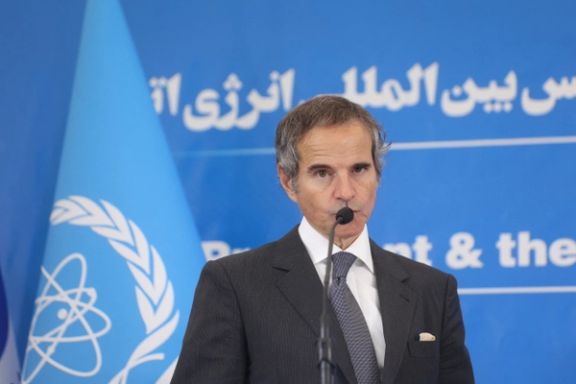IAEA's Grossi Continues Talks In Iran And Speaks About Cooperation

A joint press conference in Tehran between IAEA head Rafael Grossi and Iran’s nuclear chief Mohammad Eslami revealed little about progress on the main issues in Grossi’s visit.

A joint press conference in Tehran between IAEA head Rafael Grossi and Iran’s nuclear chief Mohammad Eslami revealed little about progress on the main issues in Grossi’s visit.
The head of the International Atomic Energy Agency said on Saturday that talks were ongoing with the Iranian side on two sets of important matters including the science sector. He referred to the large presence of reporters, saying it showed “great expectations” about the important issues between the Islamic Republic and the International Atomic Energy Agency (IAEA).
Rafael Grossi began meetings in Tehran on Friday that diplomats said were meant to push Iran to cooperate with IAEA on answering questions about why traces of uranium enriched to 84 percent were recently found in one of its nuclear facilities and also traces of fissile material discovered in 2019 at some of its older undeclared sites.
Grossi, who was speaking during a joint news conference with Eslami, the head of the Atomic Energy Organization of Iran, said the talks were taking place in an "atmosphere of work, honesty and cooperation".
But beyond that it was not clear how much progress the two sides have made on the key issues since talks began on Friday.

The official Iranian news website IRNA published a report on the news conference, which revealed very little, except a barrage of questions by local reporters about Israel’s nuclear program and its threats to attack Iranian nuclear installations. From what IRNA said, it appeared Grossi tried to dodge those questions.
ISNA semi-official new website published quotes by Mohammad Eslami, saying, “We expect relations with IAEA and its reports to create trust so that we can establish normal ties despite the actions of those who want to sabotage [good relation].”
Iran is concerned about the quarterly meeting of the IAEA Board of Governors next week and the report Grossi will submit about Iran’s willingness to cooperate with the agency, and about the 84-percent enriched uranium. The board has repeatedly censured Iran for lack of cooperation.
Eslami added; “We held talks with this intent and I am certain they will have lasting effects.” He reiterated his previous position that Iran did not have any uranium enrichment beyond 60 percent.
Iran has been exceeding the 3.67 percent enrichment level set by the 2015 nuclear deal (JCPOA) since 2019, after the United States withdrew from the agreement and imposed sanctions. But the excess enrichment had not exceeded 60-percent purity until news emerged in February that IAEA inspectors had detected uranium particles enriched to near 84 percent. It is not clear if the near-weapons grade enrichment was accidental or intentional.
Eslami also referred to a dinner Friday night, where it appears the Islamic Republic did its best to impress Grossi. Eslami mentioned the large number of women present at the dinner and referred particularly to widows of nuclear scientists killed in the past. He claimed that Grossi was impressed.
Grossi also spoke of technical and scientific cooperation with Iran, and sounded happy with the Friday night dinner, according to Fararu website in Tehran, a semi-independent news outlet.